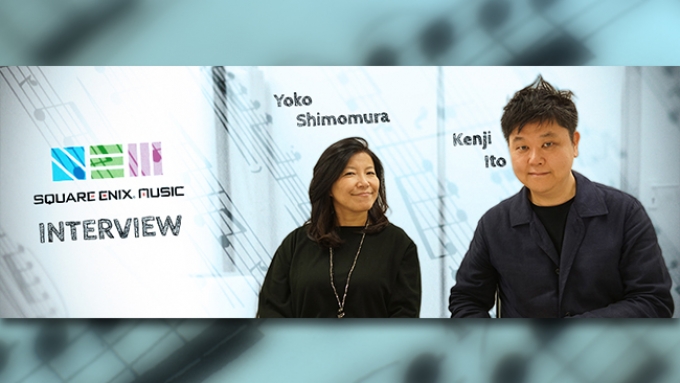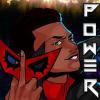Square Enix Europe's merchandise team recently had the opportunity to interview Yoko Shimomura, composer of the Kingdom Hearts series, along with many other Square Enix and Japanese video games and Kenji Ito, composer of Square Enix's SaGa video game series along with many other Square Enix and Japanese video games. During the interview, Shimomura discusses creating 'Destati', something that could be considered the theme song of the Kingdom Hearts series. You can read both parts of their interview in full below, the part discussing 'Destati' has been bolded.
Part 1
Q: Who is your favourite video game music composer and why?
Kenji Ito: Ok, you go first! [laughs]
Yoko Shimomura: Eh? That’s a tricky one… Well he might not be my absolute favourite but it was Kondo Koji, the composer for Super Mario, who was the inspiration for me to get into this industry in the first place.
It might be going a bit far to say that his music is in another dimension, but I think it was Kondo who brought game music this far so I have a huge amount of respect for him. There are many game music composers who I like though…
Ito: There are many great game music guys but one who had a great impact on me was Hirasawa Hajime who did Starfox. I was really struck by his tracks.
Q: Looking back at all these years composing music, how do you keep the inspiration flowing? Do you have some sort of ritual/routine or particular place/object… that helps you gather your thoughts?
Shimomura: I really like travelling and although I can’t say there is anywhere in particular, I often find inspiration when I am away from my everyday routine. I do get moved in small ways by everyday things, but I would say that the secret to how I can keep going if you will, or what I need to keep motivated, is to be removed from that everyday reality by being away travelling, or even just through reading a novel.
Ito: I get a lot of inspiration from comics. I really like the work of Hojo Tsukasa, such as “The Rose of Versailles” or more recently “Angel Heart”. Comics don’t have any sound at all so when I am reading I often wonder what kind of music should be playing in the background of a scene and try to visualise it, and I often put those kinds of ideas together to create my work. Q: What is your proudest accomplishment to-date as a composer?
Ito: There are a lot of those. If you mean the very first one I was proud of then probably Seiken Densetsu (“Legend of the Holy Sword”, first game in the Mana series, never released in Europe). I was around 22 at the time and it was the first time I had been put in charge of creating all the tracks for a game on my own. Having created the theme song and then proceeded to compose all of the tracks based on the story, and even produce them was great experience for my future career.
Shimomura: Whenever I finish something I always feel relieved and think “Aah, that’s over with now”. Street Fighter 2 was pretty hard, but once a game is completed you have to quickly move on to the next thing… After I finished work on Mario RPG I took a vacation of about three months off. I had been doing projects back-to-back for quite a while then, with Live A Live (never released in Europe), Front Mission and Mario RPG, and because it was the last ever Super Nintendo title I worked on, I remember there was a massive feeling of things finishing and coming to an end. So I decided to have a big holiday and started my time off in the winter, but when I returned to the office it was already cherry blossom season. [laughs]
I had travelled quite a lot during that vacation and I think it helped to keep my motivation up.
Q: Can you tell us about a song you wish you had never composed? / What do you consider your worst work so far and why?
Ito: You don’t mean a specific game here right? I think that the pieces we make are what they are. Even if there were hypothetically some tracks that I was not happy with, the fans love the games as a whole, including having those in there, so I don’t feel there is a need to go and tweak them again now.
On the other hand, when I release re-arrangements and re-workings of older music on CD, I am aware of trying to refine and perfect the songs.
Shimomura: Ah, he said something wonderful there… I don’t think I can say anything more after that, can I?! [laughs]
The songs that I have already finished are complete in and of themselves and so I do not have any regrets about them. If there is something I regret then it is often more along the lines of wishing that I had tried harder from earlier on. [laughs] Q: A genie grants you the ability to completely change life for a month and do any job you’d like, what would you pick and who would you be?
Shimomura:I have never thought about that. I really don’t like working you see… [laughs]. So I really think that the reason I can carry on working is because I have managed to do something I enjoy for a job. One month eh...? I think I would like to just play around for a month!.
Ito: I think I would like to try going on a world tour playing acoustic music. I would take a small group with myself on the piano and three to four members on violin and guitar etc, and we would mainly play ballads, starting in Japan and then heading off around the world. Thinking of the piano, I would really like to make music like that of Andre Gagnon.
Q: When in the process of composing a soundtrack, what type of song do you have the most fun working with? (Villages, Battle, Main Themes, Events…)?
Shimomura:What type would that be…? I think it differs depending on the kind of game I am working on at the time, but I do like making the music for field and exploration sections. It looks like the fans prefer battle music though. [laughs]
Ito: I love making event music, especially for tear-jerking scenes. I really like doing emotional pieces. Obviously for sad scenes but also for tears of joy when characters meet with people they love and things like that too.
Q: Is there something you have not managed to achieve yet and that is still in a corner of your head?
Ito: I really like things to do with healing and personal wellbeing, not just limited to bringing out that kind of emotion in music. So I would really like to be able to give people that kind of holistic wellbeing package, including not just music but also food and exercise of some sort perhaps, maybe some kind of personal enrichment programme or rehabilitation for the elderly etc.
Shimomura: It might be impossible to arrange but I would really like to put together a greatest hits type game music CD involving my games from all different developers and publishers and bringing together the whole body of my work. Something that brings together everything, from the songs I made a long time ago that I am a bit embarrassed about now, right through to some original pieces from new titles.
Q: Do you always see technical limitations as a hindrance to your work or do you think they can be beneficial at times? Do you sometimes miss the early days when the sounds and midi banks were more straightforward?
Ito: Those kinds of limits have really had a big effect on me. I have been making game music since the GameBoy era when you could only make three-layer sounds with a melody, bass and backing. Although I could play the piano when I started out, and had thus learned some classical stuff, I had not really studied any specific musical theory or techniques such as harmonics etc. Having to learn and master these kinds of musical techniques as I went along while composing for games was pretty brutal, but I think it was very good for me too. It was good experience but I don’t think I would like to go back and do it again!
Shimomura: I have also been composing for games since the three-layer sound era and I can remember that the Super Nintendo was really unique in its sound capabilities and really left a strong impression on me. The original NES sound hardware (called a PSG) has been used to create chip tunes and there are a number of people out there who specifically try to create music reminiscent of the NES, but I don’t think there are many who try to imitate the Super Nintendo though. So the Super NES had its own unique setup with 8 sound layers, using 2 for effects layers and having the other 6 to work with, and it brought game sound from the 3 layer era slightly closer to real music, although obviously it still sounded a bit mechanical. I really loved that era… And I really learned a lot at that time. It was an education. But I don’t think I would want to go back either! [laughs]
The current environment we have to work with is just great but I do get nostalgic and have lots of good memories about the simpler times.
Q: Can you briefly describe your composition process from the first notes to the end result in game?
Shimomura: It varies depending on the song. Sometimes I will start from scratch by sitting and brainstorming at the piano until something comes up where I think “Yes, this phrase could work”, and at other times I don’t play the piano at all and it just comes to me complete, with all the sounds right through to the end. So it really is different each time. I don’t have one fixed process that I always have to use.
Ito: I always start by asking the client what kind of image and feeling they want to project in the song. It can be something from other games, films or even vocal pieces but I always ask then to give me an Idea of what kind of music they are looking for. A lot of the time they just ask for something “that is in my style” but when I go away and write something like that they often come back telling me that it is too heavy and serious (Laughs)!! That actually happens a lot, so I always start by asking for an image of what kind of music people want.
Part 2
Q: Is there a game you would have loved composing for?
Shimomura: I think it's pretty much impossible but I would want to try doing Dragon Quest.[laughs]
After I discovered that you could create game music for a job from Super Mario Brothers, the next game that I got really hooked on was Dragon Quest. I had a classical background so Dragon Quest will always be an object of adoration for me. But if I was actually given a chance to do it, I think I would be too frightened to do anything though!
Ito: If I had to choose I would say Sakura Wars.
The Flower Division’s music was composed by Tanaka Kohei and the melody in it is just so grand that I couldn't possibly replace it! I would really like to have a go at even just a small cross section of the music for that game though.
Personal Questions
Q: You started composing 26 years ago, video game music was at its early stage and the media regarded as a boys' thing, how did it feel to be a female video game music composer at the time?
Shimomura: Well my parents were a bit perplexed by it. They asked if I was really going to be making all those beepy electronic noises! At that time I had no real problems getting into the job and they welcomed me on board, telling me to give it a go. Everyone around me did wonder if I could really compose music though.
Funnily enough, at Capcom there were lots of female composers and it actually felt a bit like a girls' club so I have never really felt it was all that unusual for a woman to be making game music.
Q: During the musical quiz at Japan Expo, you told us that you were surprised how dark Destati turned out to be. Playing through KHI and KHII is like transitioning from childhood to the teenage years and the tone gets more serious yet Destati was the first song you ever composed for the series. Can you tell us a bit more about your mind journey creating this fantastic song?
Shimomura: I was very surprised about it myself. The order first came in saying that they needed a song for the preview and I had envisaged a very cute and sweet little tune for it. Then we had an order from Tetsuya Nomura looking for something dark with a chorus, a feeling of pace, an air of tragedy and deep meaning. I was a bit unsure about this turn but carried on with the composition anyway, all the while wondering if it was really ok to have a piece like this for a Disney song. Q: You were taught the piano at an early age and had quite a classical training. Why did you choose video game music?
Ito: To put it bluntly, it was in order to get a job!
There was a reason though. At the time I was still a student at a specialist college and Dragon Quest 3 was really popular. My tutor said to me that game music is a field that will only expand from now on and asked if I knew that the renowned Sugiyama Koichi was the one who made the music for Dragon Quest. He then said that if I wanted to be a composer I should take on game music and that was what led me to get into the industry.
Shimomura: I was actually stopped by one of my teachers. He said he thought I had no chance. [laughs]. He said that "They only hire people who majored in composition, so it would doubtless be impossible for someone like you who majored in something different. It would just be a waste of time even applying."
Ito: I guess different people see it differently, huh…?
Q: The battle themes of the Saga series make heavy use of drums and slap bass with complex lines and a symphonic rock feel which was very new at the time, could you please tell us more about these influences?
Ito: I had listened to “kayokyoku” old-style Japanese pop songs since I was small and I really feel that they have a rich variety of different sounds. The genre includes orchestral pieces as well as rock and stuff… Then, when I first entered high school, Japanese hard rock became really popular. That was when I started listening to that kind of stuff and I think it had an effect on me. Special message:
Shimomura: I am going to be a guest at the Press Start concert in April 2015 and am really looking forward to meeting everybody from Paris who comes to the event. I will also keep doing my best making music so please carry on supporting me everyone!
Ito: I have never been to Europe before, either with work or privately, so if there is a chance I would really like for someone to invite me over there. Please!





Recommended Comments
Join the conversation
You can post now and register later. If you have an account, sign in now to post with your account.